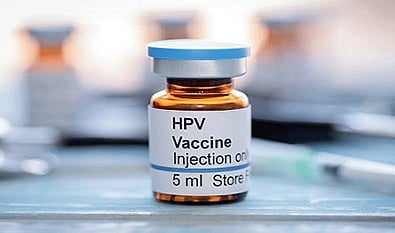According to a significant study supported by Cancer Research UK, the Human Papillomavirus, or HPV, vaccine is reducing cases of cervical cancer across the socioeconomic spectrum, with the majority of cases being prevented in more deprived groups.
Up until now, there have been worries that the HPV vaccine might affect people differently in different parts of society. Researchers at Queen Mary University of London have concluded that the HPV vaccination program in England is contributing to the closure of some cervical cancer disparities. This is after conducting the longest follow-up study on the efficacy of the HPV vaccine. The outcomes were released in the renowned BMJ, a weekly peer-reviewed medical publication.
What Is HPV?
A tiny, non-enveloped deoxyribonucleic acid (DNA) virus that infects skin or mucosal cells is known as the human papillomavirus (HPV). The genome of the circular, double-stranded virus is about 8 kilobases long. The genome codes for six early proteins necessary for virus replication as well as two late proteins, L1 and L2, which are the structural proteins of the virus.
Cervical cancer can be caused by at least 13 of the more than 100 known HPV genotypes, which are also linked to other anogenital and head and neck cancers.
About 70% of all cervical cancers are caused by the two most prevalent "high-risk" genotypes, HPV 16 and 18. In 2002, HPV was estimated to have caused 250,000 cervical cancer deaths and nearly 500,000 cases, with about 80% of those cases occurring in developing nations. Genital warts are a common benign condition of the external genitalia that causes significant morbidity.
They are caused by two "low-risk" genotypes: HPV 6 and 11. HPV is extremely contagious, peaking shortly after sexual activity begins, and most people get infected at some point in their lives.
The Research Synopsis
An observational study was conducted in England with the aim of investigating the efficacy of the Human Papillomavirus (HPV) vaccination program across different levels of socioeconomic deprivation and reproducing previous analyses on the program's impact on the incidence of cervical cancer and grade 3 cervical intraepithelial neoplasia (CIN3) using an extra 12 months of follow-up.
In this study, women aged 20–64 who lived in England between January 2006 and June 2020 were included; among them were 29,968 women diagnosed with cervical cancer and 335,228 women diagnosed with CIN3. In 2008, HPV vaccinations were made available to girls ages 12 to 13 on a regular basis throughout England. Between 2008 and 2010, catch-up campaigns focused on older teenagers who were 19 years of age or older.
Conclusions Of The Research
In England, 29968 women aged 20 to 64 were diagnosed with cervical cancer between January 1, 2006, and December 30, 2020, while 335,228 women were diagnosed with CIN3. Adjusted age-standardized incidence rates of cervical cancer and CIN3 in the additional 12 months of follow-up (1 July 2019 to 30 June 2020) were, respectively, 83.9% (95% confidence interval (CI) 63.8% to 92.8%) and 94.3% (92.6% to 95.7%) lower in the birth cohort of women who were routinely offered HPV vaccination at the age of 12–13 years than in the reference cohort of women who were never offered HPV vaccination. An estimated 687 (95% CI 556 to 819) cervical cancers and 23 192 (22 163 to 24 220) CIN3s had been avoided by mid-2020 thanks to HPV vaccination.
Although women in the most impoverished areas continued to have the highest rates, the HPV vaccination program had a significant impact on all five levels of deprivation. Women from less deprived areas had lower CIN3 rates than women from more deprived areas when they were offered catch-up vaccination (reductions of 40.6% vs. 29.6% and 72.8% vs. 67.7% for women offered vaccination at age 16–18 and 14–16, respectively). Among those who received the vaccine, there was no longer a significant decline in the incidence of cervical cancer from high to low deprivation, as observed in the reference unvaccinated group.
Conclusions Of The Research
The high efficacy of the national HPV vaccination program that had been previously noted in England continued throughout the additional year of follow-up. HPV vaccination was associated with a significantly lower incidence of CIN3 and cervical cancer in all five deprivation groups, especially in women who regularly received the vaccine.
Prevention Against Cancer-Causing Infections And Precancers
Since 2006, when HPV vaccines were first made available in the US, there has been a decrease in HPV infections and cervical precancers, or abnormal cells on the cervix that can develop into cancer.
Infections with HPV types that result in the majority of HPV cancers and genital warts have decreased by 88% among teenage girls.
Infections with HPV types responsible for the majority of HPV cancers and genital warts have decreased by 81% among young adult women.
The percentage of HPV types most frequently associated with cervical cancer among vaccinated women has decreased by 40% in terms of cervical precancers.
When Should Children Get The HPV Vaccine?
The child should be scheduled for the first dose between the ages of 11 and 12. It is possible to vaccinate your child as early as age nine in certain situations. The first dose is given six to twelve months before the second dose. It is essential to consult pediatricians and physicians.
Three doses must be administered over six months to children who begin the HPV vaccination series at age 15 or older.
Consult with your teen's doctor about getting vaccinated as soon as possible if they have not already.
The best protection comes early. For this reason, getting the HPV vaccine sooner rather than later is advised. Your child is shielded long before they come into contact with the virus.
Vaccination Of Young Adults And Teens
If they have not already received all recommended vaccinations, everyone over 26 should get the HPV vaccine.
It is not advised that anyone older than 26 receive an HPV vaccine.
After discussing their risk for new HPV infections and the potential benefits of vaccination with their doctor, some adults between the ages of 27 and 45 who had not previously received the vaccine may decide to get it.
Adult HPV vaccinations are less beneficial because a greater number of people in this age group have already had HPV exposure.
HPV Vaccine Safety
Vaccines against HPV are quite safe. Based on scientific research, there are significantly more advantages to HPV vaccination than disadvantages. Vaccines may have adverse effects, just like any other medical procedure. Since the HPV vaccine's introduction in the United States in 2006, more than 135 million doses have been administered. The most frequent, mild side effects of HPV vaccinations are pain, redness, or swelling in the arm that was injected.
The Food and Drug Administration (FDA) of the United States conducts comprehensive safety testing on all vaccines, including HPV vaccines, before granting licenses for use in the country. In clinical trials carried out prior to licensure:
Over 15,000 males and females participated in the 9-valent HPV vaccination study.
Over 29,000 males and females participated in the study of the quadrivalent HPV vaccine.
Over 30,000 females participated in the study of the bivalent HPV vaccine.
All HPV vaccines were determined to be both safe and effective.
Syncope, or fainting, can happen following any medical procedure, including vaccinations. Teenagers are more likely to experience syncope following any vaccination. Adults and adolescents should receive their vaccinations while seated or lying down. After vaccination, providers are advised to watch patients for fifteen minutes while they are seated or lying down. This is to avoid any potential harm from a fall that might happen during a syncopal event.
HPV Vaccine Effectiveness
The HPV vaccine has remarkable efficacy. Quadrivalent-type HPV infections declined by 86% in female teens ages 14 to 19 and 71% in women in their early 20s, ten years after the vaccine was advised in the US in 2006. Studies have also revealed a decline in cervical precancers and genital warts in teens and young adults following the introduction of HPV vaccinations in the US. Other countries with HPV vaccination programs have also reported decreases in the prevalence of genital warts, cervical precancer, and vaccine-type prevalence.
Although HPV vaccination does not cure pre-existing conditions or infections, it does prevent new ones. The HPV vaccine functions best when administered prior to any HPV exposure. Although not necessarily all of the HPV types are the target of vaccination, the majority of sexually active adults have already been exposed to HPV.
Women should start screening for cervical cancer at age 21 and continue until age 65. Current cervical cancer screening guidelines recommend screening for cervical cancer even in women who have received the HPV vaccine series, beginning at age 21.
Duration of Vaccine Protection
Research indicates that HPV vaccinations provide an enduring defense against HPV infection and, consequently, illness brought on by HPV infection. Research on the bivalent and quadrivalent vaccines has monitored immunized individuals for more than a decade, and no indication of a decline in protection has been observed over this period. Research on the length of time an HPV vaccination provides protection will not stop.






